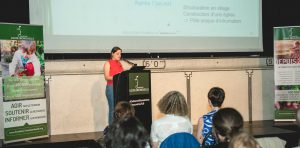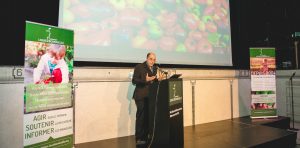The 10th Louis Bonduelle Foundation Conference was held in the unique setting of the Bain Mathieu in Montreal on 13 June 2017. An exceptional location for an equally exceptional event: seeking out different perspectives on Canadian and French diets. Oh, the joys of food culture… What are the 4 key takeaways from this event that should not be missed?
 Dietary guidelines are currently being studied in both Canada and France. A new food guide in one country, new benchmarks in the other, but they have one thing in common: the awareness of food cultures and the sustainable aspect of food.
Dietary guidelines are currently being studied in both Canada and France. A new food guide in one country, new benchmarks in the other, but they have one thing in common: the awareness of food cultures and the sustainable aspect of food.
These ideas were at the very heart of the Louis Bonduelle Foundation Conference entitled “Food Cultures: Changes and Perspectives”. Four speakers, two Canadian and two French, demystified the factors that impose changes on our dietary behaviour and encourage us to rethink consumer benchmarks.
History testifies to the influence of cultures on the act of eating
Numerous factors influence our eating habits. To begin with, our past, history, heritage, religion… and culture. In her speech, Leïa Mion (Mediterranean Laboratory of Prehistory, Europe-Africa, Aix-en-Provence), 2015 Louis Bonduelle Research Award, highlighted the fact that even in antiquity and the Middle Ages, individual dietary choices were the result of biological, socioeconomic and cultural constraints.
Through the isotope analysis of human remains, Leïa Mion has reconstructed the original source of the food eaten (sea, land or fresh water) and estimated the proportion of animal proteins (fish and meat, in particular) in the diet of individuals from twelve different sites in the Languedoc and Provence (two regions in the South of France).
 Her first finding is that eating habits vary, not only within a geographical area, but also among the individuals in the populations studied. Moreover, they evolve over time and vary between different populations of burial sites. This means that cultural and religious traditions need to be taken into consideration, as do socioeconomic factors.
Her first finding is that eating habits vary, not only within a geographical area, but also among the individuals in the populations studied. Moreover, they evolve over time and vary between different populations of burial sites. This means that cultural and religious traditions need to be taken into consideration, as do socioeconomic factors.
Indeed, how else can you explain the one coastal population among the groups studied that did not eat – of all things – fish from the sea? This specific feature poses the question of the cultural dimension of this resource, Leïa Mion concluded at the end of her presentation.
Quebec: from migratory influences to gastronomic walks
Christine Jourdan, an anthropologist at Concordia University (Montreal), has demonstrated particularly clearly how the act of eating, exemplified by the preparation of food, and thus cooking, is linked to social and cultural changes. In other words, the way of cooking forms part of the heritage passed down from generation to generation, one that evolves in line with changes in society.
This observation is based on cookery books and surveys of three generations of Montreal families. There are three particularly significant indicators:
- the use of herbs and spices,
- the respective roles of men and women in the kitchen,
- and finally, the depiction of food in the public domain (markets, festivals, TV programmes, etc.).
The issue of seasoning is no doubt the most illustrative of the changes in Quebec society, already a clever mix of a Native American basis with influences from French, English, Scottish and Irish settlers, one which is today even more diverse as a result of the country opening up to the world (with Asian and North African spices, etc.).
However, the changes are also measured in the structure of food intake, with the mass influx of women into the workforce, which has changed the preparation and planning of meals, the locations where food is consumed, the increase in importance of gastronomy with a specific identity (illustrated by the exponential success of gastronomic walks), despite an increasingly limited time being devoted to these meals.
Canada and the USA: let’s take a fresh look at food!
These are the words of Jean-Claude Moubarac from the Department of Nutrition at the University of Montreal. His presentation testifies above all to the great cultural divide that separates countries such as Canada and the USA from France or Italy. Sociological changes and the level of income and/or education alone cannot explain these remarkable differences: these four countries have experienced similar situations and have comparable standards of living.
 For the anthropologist, it is the value placed on food, on the act of cooking and that of eating that is at issue. Whilst in France or Italy a meal is a time for sharing and coming together, based on local dishes with fresh foods with a minimum of processing, Canadians and Americans increasingly neglect cooking, taking very little or no time for meals and relying on highly processed products.
For the anthropologist, it is the value placed on food, on the act of cooking and that of eating that is at issue. Whilst in France or Italy a meal is a time for sharing and coming together, based on local dishes with fresh foods with a minimum of processing, Canadians and Americans increasingly neglect cooking, taking very little or no time for meals and relying on highly processed products.
These forms of behaviour have an impact on the health of the North American population. Jean-Claude Moubarac therefore advocates a return to cooking for a better diet and takes the Brazilian food guide, which he helped write, as inspiration. It proposes a more holistic vision of food, with recommendations relating to eating habits rather than food groups, and a simple invitation: LET’S ALL get cooking!
Sustainable food: the thinking behind the new French recommendations
Meanwhile, Marie Josèphe Amiot-Carlin, Research Director in Nutrition at Aix Montpellier University, is focused on the creation of new recommendations as part of the French National Nutrition and Health Plan (PNNS, implemented in France in 2001). New objectives and preferences have now been incorporated into these guidelines.
The first is to reduce exposure to hazardous substances as far as possible (heavy metals in fish, pesticide residues in plant products). The second is to adapt the recommendations to make them achievable for the population. Thus, whilst the “at least 5 servings of fruit and vegetables per day” benchmark has been confirmed, others have been eliminated or replaced by new ones, such as the fact that pulses (peas and beans) have been moved out of the starchy food category.
The aim is to turn them into a separate group that should be prioritised (“at least twice a week”) in order to diversify sources of protein and increase people’s fibre intake. This is an approach that has another objective as well: to move towards more sustainable nutrition, in line with consumption guidelines. Popularising vegetable proteins and focusing on the amount of animal protein consumed constitute one stage in this process, along with the use of unprocessed foods, seasonal produce, short supply chains and environmentally friendly production methods, in other words ones that limit the number of inputs used.
This, according to Marie Josèphe Amiot-Carlin, is an achievable goal, one that does not involve moving too far away from existing eating habits, whilst at the same time satisfying nutritional needs.
Jacynthe Lafrenière, winner of the 2017 Louis Bonduelle Research Award
To close the #rencontresFLB, a young researcher from Université Laval in Quebec was presented with the Louis Bonduelle Research Award in recognition of her work: Jacynthe Lafrenière.
The objective of her project, which is ongoing, is to develop a tool that will allow researchers and clinicians to classify individuals in accordance with the quality of their food and the extent to which they follow nutritional guidelines. The entire Louis Bonduelle Foundation team would like to express their sincere congratulations to Jacynthe Lafrenière!
For download and upcoming…
How can we be “guiding eaters yesterday, today, and tomorrow”? Alongside the #LBFconference in Montreal, the Foundation has developed a summary document that invites you to embark on a journey of (re)discovery of the dietary guidelines established in the two countries. It is a well-documented work that allows us to study the issue in greater depth and can be downloaded here.
Stay connected to #LBFconference: we will soon be publishing the speakers’ slides and video extracts, as well as other documents to help you learn more about food cultures and their impact on our behaviour.



 Chard
Chard  Carott
Carott  Vegetable garden: growing garlic
Vegetable garden: growing garlic 









